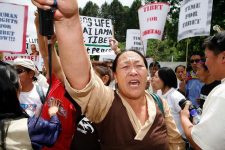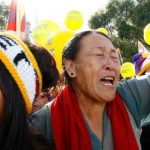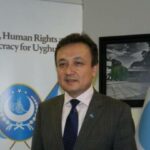The US Enacts a Law to Curb Ongoing Tibetan Human Rights Abuses

In a move that Tibetan rights activists hope will embolden other countries to take action, the United States enacted a law on 19 December that targets the ongoing and intensifying human rights violations being carried out in Chinese occupied Tibet.
Passed with bipartisan support, the Reciprocal Access to Tibet Act of 2018 requires the US State Department to monitor the level of access to Tibetan areas China grants to US citizens, including government officials, journalists and tourists.
The US secretary of state has been tasked with identifying the Chinese Communist Party (CCP) officials responsible for restricting US access to these areas and then punishing them by imposing a visa ban, so they cannot enter the United States.
The Chinese government places tight restrictions on travel to and around areas within the formerly independent nation of Tibet. The legislation outlines that 39 US officials requested diplomatic access to Tibetan regions between 2011 and 2015 and only four were allowed in.
The law is designed to open up these isolated areas to foreigners and thus make it more difficult for CCP officials to continue to perpetrate systematic rights abuses upon the local Tibetan population.
A perverse level of repression
The Freedom in the World 2018 report ranks Tibet as the number two least free region on the globe, with Syria being number one. Indeed, changes over recent years have led to Tibet being one of the most heavily policed and surveilled places on earth.
Under Chinese occupation, central Tibet is now known as the Tibetan Autonomous Region (TAR). In 2011, a former soldier turned politician Chen Quanguo was appointed CCP secretary of the TAR. And he unleashed an intensive security drive in the area.
Thousands of new police officers were hired. A high-tech surveillance system comprised of thousands CCTV cameras was set up. And almost one thousand community-based “convenience police stations” were established to provide all-pervasive grid-style monitoring of large urban areas.
In 2011, Chen also launched a campaign known as Benefit the Masses, which involved 21,000 CCP cadres being stationed in over 5,000 villages around the countryside. These teams of four or five CCP officials were charged with monitoring the locals and re-educating them politically.
Denial of sovereignty and identity
CCP troops began marching into the eastern Tibetan regions of Kham and Amdo soon after the People’s Republic of China was proclaimed in September 1949. And a decade on, China had consolidated its control over the Himalayan nation.
On 10 March 1959, the Tibetan Uprising took place in the capital of Lhasa, when around 300,000 Tibetans surrounded the Potala Palace. Following the brutal suppression of the protesters by Chinese troops, the Dalai Lama fled Tibet and this led to the mass exodus of about 85,000 Tibetans.
Since the occupation began, the CCP has been carrying out a program of cultural genocide that includes the destruction of local Buddhist culture, the attempted erasure of the Tibetan language, the forced removal of nomads from their lands and a massive transmigration program into the area.
In May this year, Tashi Wangchuk was convicted of inciting separatism after appearing in a New York Times documentary in 2016. Sentenced to five years in prison, the Tibetan language activist had simply highlighted China’s systematic erosion of his people’s culture.
Breaking down the cultural fabric
The recently passed US legislation identifies Larung Gar as a Tibetan area that US citizens have been banned from entering. Situated in the Chinese province of Sichuan, Larung Gar is the world’s largest centre for Tibetan Buddhist study.
In July 2016, Chinese officials launched a demolition and evacuation program in the local area citing overcrowding as their reasoning behind it. By mid-2017, 4,725 dwellings had been destroyed and 4,825 monks and nuns had been evicted from the area.
Human Rights Watch reported in January that the CCP has imposed administrative control over the Tibetan monastic institute. Around 200 CCP cadres have taken over all levels of management at the academy.
And in a further attempt to eradicate the local culture, Chinese officials announced in October that they were banning the Dechen Shingdrup prayer festival for the third year in a row and prohibited outsiders from entering Larung Gar.
Ongoing self-immolations
On 9 December, two 16-year-old Tibetans set fire to themselves in protest of the Chinese occupation of their country on a road Tibetans refer to as Hero Street in Ngaba county, eastern Tibet. Witnesses reported hearing Gendun Gyatso and Choekyi Gyatso calling for freedom in Tibet.
Their peaceful protests followed another self-immolation on the day prior in the same county. Dugkhi, a Tibetan man in his early twenties, set himself ablaze and called for the long life of the Dalai Lama.
This brings the number of Tibetans living in their occupied homeland who have self-immolated to 157 since 27 February 2009. Another 10 Tibetans living in exile have set themselves alight over the same period in order to draw attention to the plight of their people.
A warning not to meddle
The enactment of the Tibetan access law was the second US move relating to the region this month. On 4 December, US acting deputy assistant secretary of state for East Asian and Pacific Affairs Laura Stone said CCP officials mustn’t make decisions regarding Tibetan religious matters.
The announcement comes amid fears that the Chinese government will step in and try to choose the successor to the current 14th Dalai Lama after he passes away. Living in exile in India, the Dalai Lama is now 83 years of age.
Independence once more
The leading Tibetan spiritual leader, the Dalai Lama no longer calls for independence. He now promotes a middle-way approach for the Tibetan people, which involves genuine autonomy under the framework of the People’s Republic of China.
However, one of the oldest groups-in-exile, the Tibetan Youth Congress (TYC) is still pushing for complete independence for Tibet. And TYC information secretary Tsewang Dolma told Sydney Criminal Lawyers® last month that she believes her nation will be free again.
The Tibetan rights advocate pointed out that many of the countries that gained independence last century had been under foreign rule for much longer than the close to 70 years that her homeland has been.
“So, we still have the hope,” Tsewang made clear. “And we know that we are not doing something wrong or asking for something that is not ours. This is something which is our birthright and the truth.”







